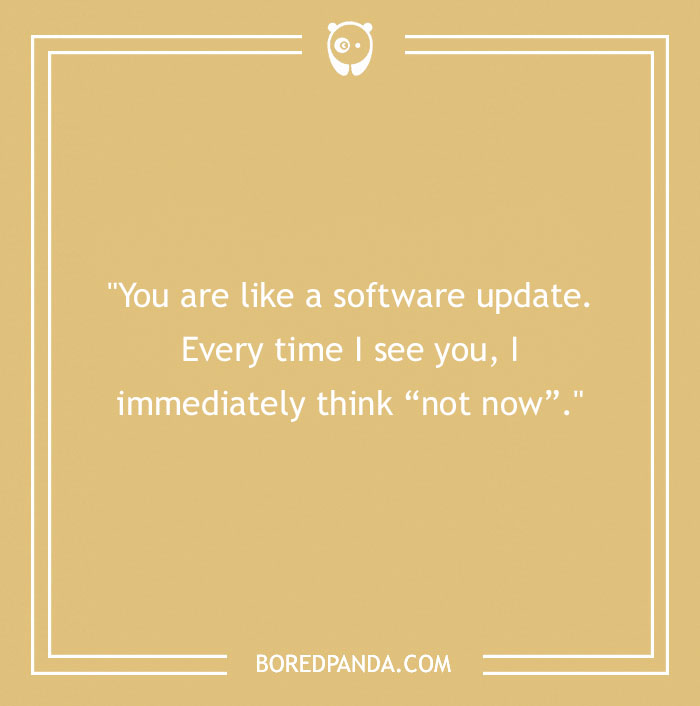There are moments, you know, when a quick, clever comeback is just what you need to brighten a conversation or perhaps even, in a way, playfully put someone in their place. Whether it's with your closest friends or someone you're just getting to know, having a good roast ready can absolutely transform an interaction. It's about bringing some lighthearted heat, a friendly spark, to your chats, and really, who doesn't enjoy a good laugh?
We've all been there, haven't we? That instant when you wish you had the perfect retort, something witty and memorable that leaves everyone chuckling. Luckily for you, we've gathered a really big collection of roasts, the kind that are both savage and hilarious, designed to give you an edge in those friendly arguments. These aren't just any old insults; they're crafted to be artful, quite witty, and precise in their humor, so you can own any conversation with a good dose of fun.
At its core, roasting is about humorously poking fun at someone or something, but it's crucial to remember that it's never meant to be mean-spirited or truly hurtful. It's a way to add humor to any discussion, provided everyone involved is on the same wavelength. So, if you're looking to playfully tease a friend, deliver a sassy comeback, or even gracefully stop an unwanted advance, we've got your back with this ultimate list of roasts that are, frankly, pretty amazing.
- Surgery Prayer Quotes
- Morgan Wallen Girlfriend List
- Medieval Last Names For Royals
- Ghostface Killah Height
- A1 Bentley Net Worth
Table of Contents
- What is Roasting, Anyway?
- Why Use a Roast on a Guy?
- The Golden Rules of Roasting
- Types of Roasts to Say to a Guy
- Delivering Your Roast with Finesse
- When to Hold Back on the Roast
- Mastering the Art of Witty Banter
- Frequently Asked Questions About Roasts
What is Roasting, Anyway?
Roasting, in its purest form, is about humorously criticizing or poking fun at someone. It's a comedic tradition, really, where jokes are made at a person's expense, but the intent is always good-natured. Think of it as a verbal sparring match, a playful contest of wits where the goal is laughter, not hurt feelings, so it's quite a delicate balance.
The best roasts are those that are clever, hilarious, and, in a way, perfect for gently taking someone down a peg without being truly mean. They're about finding the humor in quirks or common situations, and then expressing it in a way that makes everyone, including the target, laugh. You see, it's about being sharp, but also kind.
Our collection includes roasts that are unique, creative, and sometimes a bit weird, but always designed to be funny. These brutal roasts are, as a matter of fact, equal parts savage and hilarious, ensuring they leave your friends laughing and your reputation for witty remarks absolutely soaring. It’s about being memorable, you know?
- Nia Jax Boyfriend
- Straight Up Savage Gossip Quotes
- Cartoon Crushes
- Liza Fitzpatrick
- Alejandro Fernandez Son
Why Use a Roast on a Guy?
Using a good roast on a guy, especially a friend, can really strengthen bonds. It shows you're comfortable enough with them to engage in playful banter, and it creates shared moments of laughter. It’s a way of saying, "I like you enough to joke around," which is, in some respects, a sign of affection.
For many, a well-placed roast is a sign of intelligence and quick thinking. It demonstrates that you can think on your feet, delivering a sassy comeback or a funny insult when the moment calls for it. This skill, you know, can certainly help you get an edge over your friends in arguments, but always in a good-spirited way.
Sometimes, a roast can even serve a practical purpose, like stopping an unwanted advance with a humorous, yet firm, remark. It allows you to set boundaries while keeping the mood light, which can be a rather effective approach. It's about disarming a situation with wit, basically.
The Golden Rules of Roasting
While roasts are meant to be funny, there are some very important guidelines to follow to ensure they land well and don't cause genuine offense. Remember, the core idea is humor, not malice. This is, you know, absolutely crucial for good banter.
Knowing Your Audience
This is, arguably, the most important rule. You need to know the person you're roasting very well. What are their sensitivities? What do they find funny? A roast that works for one friend might completely miss the mark, or even offend, another. So, you know, tailor it to them.
Consider your relationship with the person. Are they a close friend who understands your humor, or more of an acquaintance? The level of "savage" you can go with, frankly, depends entirely on this bond. It's about respecting boundaries, even when joking.
Also, consider the group you're with. Is everyone on the same page about friendly teasing? Roasting insult jokes are a fun way to bring humor into any conversation, as long as everyone understands the playful intent. Otherwise, it might, you know, fall flat or worse.
Timing is Everything
A roast delivered at the wrong moment can feel awkward or inappropriate. The best roasts are often spontaneous, fitting perfectly into the flow of a conversation. It's about seizing the moment, like your chance to shine with a clever remark, or something like that.
Avoid roasting someone when they're already feeling down or are in a serious situation. Humor works best when spirits are generally high and everyone is receptive to a laugh. You want to add friendly heat, not, you know, actual discomfort.
A good roast, as a matter of fact, often comes as a quick comeback to something someone just said or did. This makes it feel natural and less like a planned attack, which is, basically, the whole point of good banter.
Keep It Playful
The intention behind your roast should always be humor, not to genuinely hurt or diminish someone. If you find yourself leaning into anger or frustration, it's probably not the right moment for a roast. It's about lighthearted fun, you know, a bit of silliness.
Your tone of voice, facial expressions, and body language are just as important as the words themselves. A playful smirk or a lighthearted delivery can make even a savage roast land as funny rather than offensive. It's, like, all in the delivery.
Remember, these jokes can add some friendly heat to your interactions, but they should never cross the line into bullying or genuine meanness. The goal is to leave your friends laughing, not feeling attacked, which is, you know, pretty important.
The Comeback Factor
A true master of roasting can also take a roast. If you're dishing them out, be prepared to receive them back. It's a two-way street, a give-and-take of witty remarks that keeps the conversation lively. You want to be able to laugh at yourself, too, basically.
Having a good comeback ready for when you get roasted shows confidence and a good sense of humor. It proves you're in on the fun and can handle a playful jab, which is, in some respects, part of the game. It’s all about the back and forth, you know?
Sometimes, the best response to a roast is simply to laugh it off or to agree with it in an exaggerated way. This disarms the situation and keeps the playful energy going, which is, you know, pretty effective. It's about not taking yourself too seriously.
Types of Roasts to Say to a Guy
We've prepared for you a huge collection of roasts, divided into several categories, so you can find just the right one for any situation. Whether you need a quick comeback, a funny insult, or something downright savage, we've got you covered. These are, you know, pretty versatile.
Funny Roasts
Funny roasts are generally lighthearted, often based on common experiences or minor quirks that everyone can relate to. They aim for a universal chuckle and are usually safe for most social settings. They are, in a way, the bread and butter of friendly banter.
These roasts might gently point out someone's messy habits, their love for a particular, perhaps questionable, TV show, or their consistent lateness. The humor comes from the relatable truth in the observation. For instance, "You're so good at being late, they should name a clock after you."
Another example might be, "Is your brain made of sponges? Because it seems to absorb absolutely nothing." These are designed to be amusing without digging too deep, just a little playful jab, you know, to get a laugh. They are, essentially, about shared human experiences.
Clever Roasts
Clever roasts require a bit more thought and often involve wordplay, irony, or a subtle jab that makes people think before they laugh. They're about surgical precision, hitting a specific point with wit rather than brute force. They are, quite frankly, an art form.
These roasts might reference a specific event, a shared inside joke, or a nuanced observation about someone's personality. For example, if a friend is always complaining about being busy but never seems to get anything done, you might say, "You're so busy, I'm surprised you found time to do absolutely nothing today."
Or, if someone is known for their questionable fashion sense, a clever roast could be, "Did you get dressed in the dark, or is that just your natural aesthetic?" These roasts are, you know, designed to make people pause, then chuckle at the smartness of it all. They're about being witty, essentially.
Savage Roasts
Savage roasts are the most impactful, designed to leave a lasting impression, but they require the most careful handling. They are meant for close friends who truly understand the spirit of the game and can take a hard hit with a smile. These are, you know, pretty intense.
These brutal roasts are, as my text says, equal parts savage and hilarious. They might target a long-standing inside joke, a well-known flaw, or something that truly "destroys someone's ego—without being evil." An example could be, "I've seen more personality in a brick wall than in your last conversation."
Another savage, yet hopefully funny, roast might be, "Your brain must be a black hole because it seems to attract absolutely no intelligent thoughts." These are the ones that leave your friends laughing, sometimes, you know, almost crying from the sheer audacity. They are, basically, designed to be memorable.
Quick Comebacks
Sometimes, you just need a quick comeback, a snappy response that shuts down a playful jab or turns the tables. These are about speed and wit, delivering a retort before the moment passes. They are, you know, pretty essential for lively banter.
If someone says something silly, you might respond with, "Did you practice that line in the mirror, or did it just come to you in a dream?" Or, if they're trying to one-up you, "Oh, I'm sorry, did my success interrupt your struggle?" These are designed to be immediate and impactful.
Having a few go-to quick comebacks in your mental arsenal can really boost your confidence in social situations. They allow you to playfully insult a friend or give a sassy comeback without missing a beat, which is, you know, pretty cool. They're about being ready for anything, essentially.
Roasts for Unwanted Advances
These roasts serve a slightly different purpose: to politely, yet firmly, deflect unwanted attention. They use humor to create distance and discourage further advances, without being overly aggressive or rude. They're about maintaining your boundaries with wit, you know, a bit of grace.
If someone is being overly persistent, a roast could be, "Are you always this charming, or did you just forget your manners today?" Or, if they're making a cheesy pickup line, "That line is so old, it probably has its own fossil record." These are designed to be disarming and clear.
The key here is to keep it light but firm, using humor to make your point clear without escalating the situation. It's about playfully insulting a friend or stopping an unwanted advance with a clever turn of phrase, which is, basically, a very useful skill. It's about saying "no" with a smile, in a way.
Delivering Your Roast with Finesse
The words themselves are only half the battle; how you deliver a roast is, you know, just as important. Your tone, your expression, and your timing can make all the difference between a hilarious moment and an awkward silence. It's about the performance, really.
Maintain eye contact, but not in an aggressive way. A playful twinkle in your eye or a slight smirk can convey that you're joking. Your voice should be light and confident, never accusatory or genuinely angry. It's, like, all about the vibe you create.
A slight pause before delivering the punchline can build anticipation, making the roast even funnier. And, of course, be ready to laugh along with everyone else, especially the person you've roasted. This shows you're all in it for the fun, which is, you know, pretty much the goal.
When to Hold Back on the Roast
Even with the best intentions, there are times when a roast is simply not appropriate. Knowing when to keep a witty remark to yourself is, arguably, a sign of true social intelligence. It's about reading the room, basically.
Avoid roasting someone in front of people they might be trying to impress, like a new boss or a date. This can undermine their confidence and make them feel embarrassed, which is, you know, completely against the spirit of roasting. Public humiliation is never the goal.
Also, steer clear of sensitive topics. If you know someone is struggling with something personal, or has a particular insecurity, that is absolutely not the time for a roast. Humor should lift spirits, not, you know, add to someone's burdens. It's about empathy, essentially.
If you're unsure if a roast will land well, it's always better to err on the side of caution and hold back. A moment of silence is far better than a moment of regret. Remember, roasting is not meant to be malicious or hurtful, so, you know, always prioritize kindness.
Mastering the Art of Witty Banter
Developing your roasting skills is part of a larger journey toward mastering witty banter and engaging conversation. It's about becoming more articulate, quicker on your feet, and generally more fun to be around. This is, you know, a pretty valuable social skill.
Practice makes perfect. The more you engage in playful conversations, the more natural your comebacks and roasts will become. Pay attention to how others use humor, and learn from their techniques. You'll find yourself, you know, getting better with every interaction.
Reading widely, listening to stand-up comedy, and even just observing everyday interactions can provide a wealth of material and inspiration for your roasts. The goal is to discover the best roasts to spice up your comebacks and own any conversation with humor. Learn more about the power of witty dialogue on our site, and for more tips on improving your social interactions, check out this page.
Ultimately, the aim is to use humor to connect with people, to create memorable moments, and to simply enjoy the playful side of human interaction. These 150 best roasts are clever, hilarious, and perfect for destroying someone’s ego—without being evil. So, you know, go forth and roast responsibly.
For more insights into the art of playful verbal sparring, consider exploring resources on The Art of Banter. It's about understanding the nuances of communication, essentially.
Frequently Asked Questions About Roasts
People often have questions about how to use roasts effectively and appropriately. Here are some common inquiries we hear, you know, pretty often.
Q: How do I know if my friend will take a roast well?
A: The best way to tell is by observing their past reactions to jokes and teasing. If they generally laugh at themselves and others in a friendly way, they're probably a good candidate. Also, start with milder roasts and see how they respond, you know, just to test the waters.
Q: What if my roast accidentally offends someone?
A: If you accidentally offend someone, the most important thing is to apologize sincerely and immediately. Explain that your intention was humor, not harm. It's crucial to acknowledge their feelings, and, you know, learn from the experience for future interactions. That's, basically, how you handle it.
Q: Can I use roasts in a professional setting?
A: Generally, it's best to avoid roasts in professional settings. Workplace humor should typically be more universally appropriate and less personal, so it's, you know, a bit risky. Save the savage roasts for your closest friends outside of work, honestly.
- Prank Number
- Early Frances Bavier Husband
- Snap Streak List
- Cody Detwiler Family Business
- Fake Numbers To Give Out Funny



Detail Author:
- Name : Verna Heller
- Username : jkovacek
- Email : sophia28@hotmail.com
- Birthdate : 1982-09-18
- Address : 48250 Armand Orchard Apt. 719 East Marcel, MA 92716
- Phone : 1-680-263-0208
- Company : Davis, Jacobson and Kunze
- Job : Real Estate Appraiser
- Bio : Ipsum magnam est velit sed consequatur quo. Dolore ea quo saepe praesentium sint molestiae ipsam itaque. Vero itaque neque ad quod ut.
Socials
twitter:
- url : https://twitter.com/roscoewalter
- username : roscoewalter
- bio : Iure ipsam dolores consequatur nesciunt ut repellendus. Unde et rerum perferendis illum. Aut omnis ut aut voluptatum.
- followers : 1673
- following : 2443
linkedin:
- url : https://linkedin.com/in/roscoe6960
- username : roscoe6960
- bio : Ab aspernatur voluptates omnis.
- followers : 3183
- following : 966